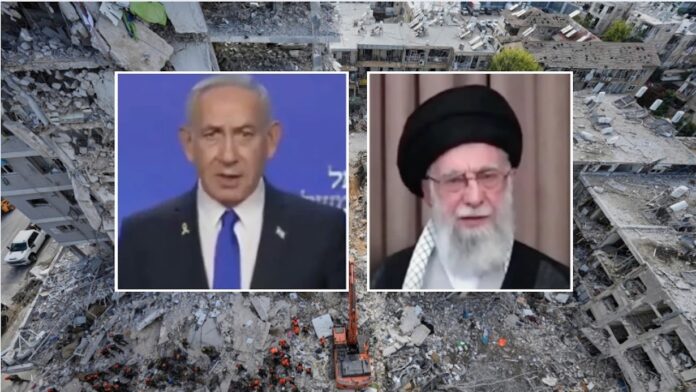- Summary of Israel-Iran Conflict (June 20, 2025):
- Escalating Attacks: Israel and Iran exchanged heavy missile strikes, hitting nuclear and military targets; the strikes also impacted civilians and hospitals.
- Rising Casualties: The attacks killed or injured hundreds across both countries. Additionally, the conflict displaced thousands, and Iran reported internet and flight disruptions.
- Global Response: International leaders called for restraint and peace talks. Meanwhile, the U.S. and EU weighed possible intervention and diplomatic solutions.
Tensions between Israel and Iran have now entered their seventh day, with the conflict escalating on multiple fronts. What began as a series of targeted strikes has grown into a full-scale exchange involving missile attacks, military threats, and international concern. From deadly airstrikes and civilian casualties to diplomatic efforts and global warnings, here’s a breakdown of the most significant developments from June 20, 2025.
Fighting
- Israeli forces launched a wide-ranging air campaign across Iran, targeting critical sites. These include the Natanz nuclear facility and the Khondab heavy water reactor, formerly known as Arak.
- In retaliation, Iran fired a missile that hit Soroka Hospital in Beersheba, southern Israel, injuring dozens. The hospital is a primary treatment center for wounded Israeli soldiers.
- Iran’s state media, IRNA, claimed that the missile targeted a key Israeli military intelligence complex in the Gav-Yam Technology Park, not the hospital.
- Prime Minister Benjamin Netanyahu vowed that Iran would suffer a “heavy price” for attacking Israeli soil.
- Israel claimed it successfully destroyed Iran’s internal security headquarters in Tehran. Additional explosions were reported in Karaj and near Payam Airport, signaling ongoing Israeli strikes.
- Multiple Iranian missiles struck Jerusalem and Tel Aviv, with at least four confirmed impact zones.
- According to Bloomberg, unnamed U.S. officials are preparing for a potential American strike on Iran. This indicates possible direct U.S. involvement in the near future.
- White House Press Secretary Karoline Leavitt said President Donald Trump will decide within two weeks whether the U.S. will enter the conflict. Trump himself remains vague: “I may do it. I may not do it.”
- Senator Lindsey Graham urged Trump to launch an attack on Iran’s Fordow nuclear site. This facility is embedded deep within a mountain.
- The U.S. Air Force repositioned many aircraft stationed at the Al Udeid Air Base in Qatar. This move is seen as a precaution ahead of further escalation.
- Israeli Defense Minister Israel Katz publicly threatened Iran’s Supreme Leader Ayatollah Ali Khamenei. He stated, “Such a person is forbidden to exist.”
- In response, Khamenei posted on X (formerly Twitter). He claimed U.S. and Israeli threats only reveal “the weakness and incapability” of the Israeli regime.
- Turkey has increased security along its border with Iran. However, a Turkish defense official reported no unusual movement of refugees or migrants.
Casualties and Disruptions
- Israeli officials reported that 24 people have died due to Iran’s missile attacks. Moreover, more than 200 were injured in the Soroka Hospital strike alone.
- Human Rights Activists, a Washington-based group, stated that at least 639 people have died in Israeli attacks across Iran.
- Iran has not consistently reported casualty figures but previously confirmed over 240 dead and 1,277 wounded.
- Iranian authorities announced the arrest of 24 individuals allegedly spying for Israel, according to the Tasnim news agency.
- Domestic and international air traffic in Iran remains heavily restricted. All flights are grounded until at least 2pm local time, according to IRIB state TV.
- Thousands in Israel have lost their homes due to Iranian missile attacks. The Interior Ministry reported 5,110 people homeless, including 907 from Tel Aviv alone.
- Internet access remains shut down across Iran for over 24 hours, according to NetBlocks, a digital rights monitoring group.
Diplomacy
- Iran’s Foreign Minister Abbas Araghchi is set to meet European officials in Geneva on Friday. This includes his counterparts from the UK, France, and Germany, as well as the EU’s chief diplomat.
- Iranian Nobel laureates Narges Mohammadi and Shirin Ebadi called for an immediate end to the war. They urge both nations to embrace dialogue over violence.
- Russian President Vladimir Putin declined to comment on the possibility of Khamenei’s assassination but emphasized the need for peaceful solutions. He insisted on protecting both Iran’s right to peaceful nuclear energy and Israel’s security.
- UN Human Rights Chief Volker Turk condemned the targeting of civilians and urged restraint from both parties.
- France, through President Emmanuel Macron’s office, announced plans with EU allies to push for a diplomatic resolution to the conflict.
- Rafael Grossi, head of the IAEA, told Al Jazeera there is no evidence that Iran is currently working on nuclear weapons.
- Iran’s Foreign Ministry, however, accused Grossi and the IAEA of bias. They claimed their reports were exploited by Israel as justification for attacks.
- Iraqi Grand Ayatollah Ali al-Sistani warned that targeting Iran’s religious leadership could trigger widespread chaos in the region. He urged the global community to find a peaceful solution and end the war.
- Israeli Prime Minister Netanyahu clarified that toppling the Iranian regime is not Israel’s official objective. However, he admitted it could be a possible outcome of the conflict.




